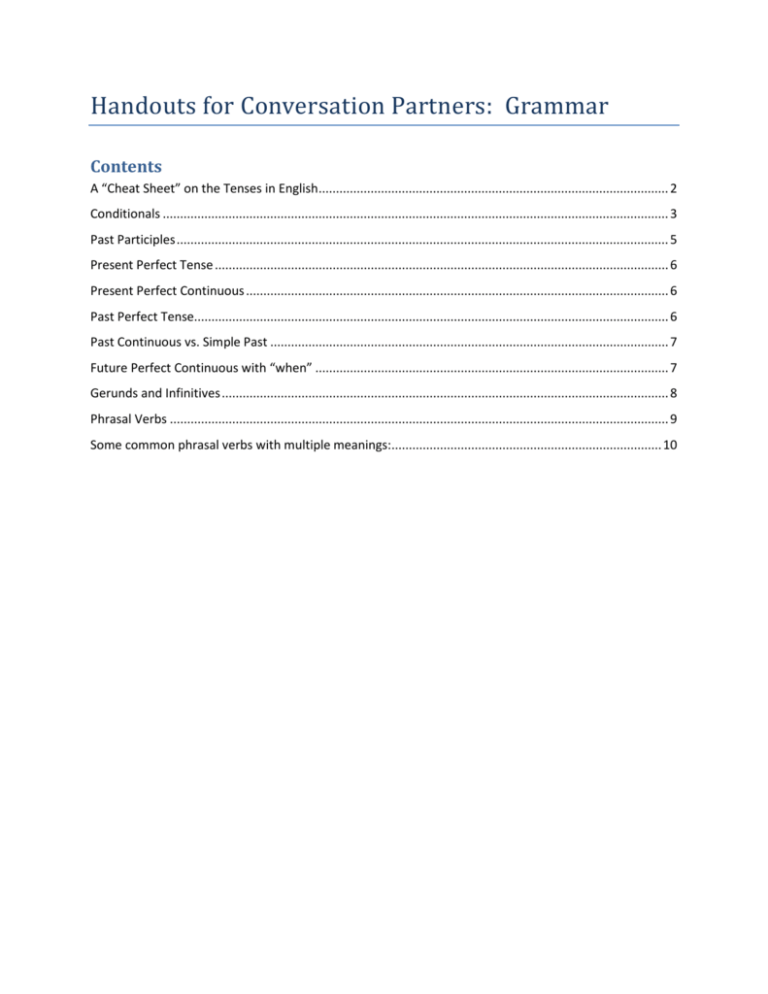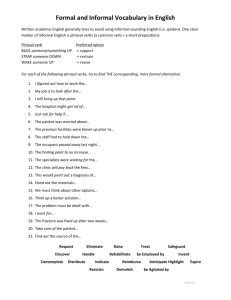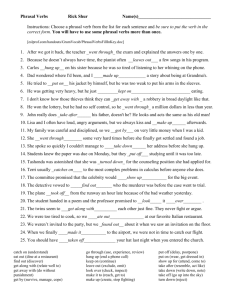
Handouts for Conversation Partners: Grammar
Contents
A “Cheat Sheet” on the Tenses in English ..................................................................................................... 2
Conditionals .................................................................................................................................................. 3
Past Participles .............................................................................................................................................. 5
Present Perfect Tense ................................................................................................................................... 6
Present Perfect Continuous .......................................................................................................................... 6
Past Perfect Tense......................................................................................................................................... 6
Past Continuous vs. Simple Past ................................................................................................................... 7
Future Perfect Continuous with “when” ...................................................................................................... 7
Gerunds and Infinitives ................................................................................................................................. 8
Phrasal Verbs ................................................................................................................................................ 9
Some common phrasal verbs with multiple meanings:.............................................................................. 10
Writing Center (last updated August 2014) 2
A “Cheat Sheet” on the Tenses and Voices in English
Tense
Simple Present
Present Continuous
Simple Past
Past Continuous
Examples
I run every day.
The bus arrives at 11.
I’m working today.
I studied for the test for 5 hours
last night.
I went to the movies on
Thursday.
I was studying yesterday.
Future
I’m going to go running later.
I’ll have my Master’s degree at
the end of this year.
Present Perfect
I’ve never been to Brazil.
Have you ever eaten alligator?
She hasn’t eaten yet.
Present Perfect continuous
What have you been doing
lately?
I’ve been taking night classes at
Temple.
I had been his roommate for
nine months when he
disappeared.
Past Perfect (Continuous)
When to use
To describe a habit;
Schedules
To describe an action you’re
doing right now
To describe something you did in
the past that had a specific
beginning or end, or that you
only did once
To describe something you did
that doesn’t have a specific
beginning or end
Future plans
Going to is usually for short term
plans, and “will” is usually for
long-term plans (there are
exceptions, of course)
To describe something you have
done at some point in your life,
or something you’ve never done
in your life (usually it is over a
long period of time); use with
ever, never, and yet
Something that started in the
past and continued until now
Something that started in the
past and continued until another
moment in the past
Conditional
If I were you, I wouldn’t smoke
so much.
If I had a million dollars, I’d buy a
mansion.
See conditionals explanation on
next page
Subjunctive Tense (often used
as part of conditionals)
The President demands that the
National Guard be called in.
Other examples: Long live the
king!
Come what may
God Bless America!
Active Voice
The National Guard protected
the border.
The National Guard was called in
to protect the border.
Passive Voice
Writing Center (last updated August 2014) 3
Conditionals
The Present Real Conditional is used to talk about what you normally do in real-life situations.
Examples:
• If I go to a friend's house for dinner, I usually take a bottle of wine or some flowers.
• When I have a day off from work, I often go to the beach.
• If the weather is nice, she walks to work.
The Past Real Conditional describes what you used to do in particular real-life situations.
It suggests that your habits have changed and you do not usually do these things today.
• If I went to a friend's house for dinner, I usually took a bottle of wine or some
flowers. I don't do that anymore.
• When I had a day off from work, I often went to the beach. Now, I never get time off.
• If the weather was nice, she often walked to work. Now, she usually drives.
Both "if" and "when" are used in the Future Real Conditional, but the use is different from
other Real Conditional forms. In the Future Real Conditional, "if" suggests that you do not know
if something will happen or not. "When" suggests that something will definitely happen at
some point; we are simply waiting for it to occur. Notice also that the Simple Future is not used
in if-clauses or when-clauses.
Examples:
• When you call me, I will give you the address.
You are going to call me later, and at that time, I will give you the address.
• If you call me, I will give you the address.
If you want the address, you can call me.
The Future Unreal Conditional is used to talk about imaginary situations in the future. It is not
as common as the Future Real Conditional because English speakers often leave open the
possibility that anything MIGHT happen in the future. It is only used when a speaker needs to
emphasize that something is impossible. Because this form looks like Present Unreal
Conditional, many native speakers prefer Form 2 described below.
Examples:
• If I had a day off from work next week, I would go to the beach.
I don't have a day off from work.
• I am busy next week. If I had time, I would come to your party.
I can't come.
• Jerry would help me with my homework tomorrow if he didn't have to work.
He does have to work tomorrow.
Form 2 of the Future Unreal Conditional is also used to talk about imaginary situations in the
future. Native speakers often prefer this form over Form 1 to emphasize that the conditional
Writing Center (last updated August 2014) 4
form is in the future rather than the present. Also notice in the examples below that this form
can be used in the if-clause, the result, or both parts of the sentence.
Examples:
• If I were going to Fiji next week, I would be taking my scuba diving gear with me.
In if-clause and result
I am not going to go to Fiji and I am not going to take my scuba gear with me.
• If I were not visiting my grandmother tomorrow, I would help you study. In ifclause
I am going to visit my grandmother tomorrow.
• I am busy next week. If I had time, I would be coming to your party. In result
I am not going to come to your party.
Adapted from: Englishpage.com
Writing Center (last updated August 2014) 5
Past Participles
Past participles are used with the present perfect, past perfect, and present and past perfect
continuous tenses.
A general rule to follow: Verbs that are irregular in the past are often irregular in the past
participle. Usually (but not always!), these verbs take on the present tense root followed by
“en”.
•
•
•
I eat cereal every day.
I ate a bagel yesterday.
I have eaten sushi before.
Eat + “en” eaten
Examples:
Present
Drive
Get
Write
Take
Fall
Simple Past
Drove
Got
Wrote
Took
Fell
Past Participle
driven
Gotten
Written
Taken
Fallen
Some irregular verbs do not change. They are the same in the past and past participle.
Examples:
Present
Simple Past
Buy
Bought
Teach
Taught
Sleep
Slept
Cut
Cut
*Words like cut, put, and quit never change verb form.
Past Participle
Bought
Taught
Slept
Cut*
Verbs that are regular “-ed” in the past are usually “-ed” in the past participle.
Present
Walk
Talk
Call
Try
Simple Past
Walked
Talked
Called
Tried
Past Participle
Walked
Talked
called
Tried
Writing Center (last updated August 2014) 6
Present Perfect Tense
Americans use the present perfect tense almost every day.
It describes:
An action we just completed, or an action we completed already today
•
I’ve eaten already.
An action we completed sometime in our lives
•
•
Have you ever been to Japan?
Yes, I have.
An action we plan to complete (using yet):
•
•
I haven’t written my paper yet.
She still hasn’t gone to the doctor.
Present Perfect Continuous
This form is used to talk about something you started doing in the past and continue to do in the
present. It usually used to answer questions such as:
•
•
•
•
What have you been doing lately/what have you been up to lately?
I’ve been studying a lot.
Where’ve you been?
I’ve been working all day.
Past Perfect Tense
Think of this tense as the “past of the past.” For example, if we are describing something that hadn’t
happened until a certain point in the past:
I had never seen an elephant until I went to the zoo last year.
He had seen the movie three times already when he went to the theater last week.
Had you ever learned English before coming to the U.S. in 2008?
Yes, I’d learned some English in 2002.
Writing Center (last updated August 2014) 7
Past Continuous vs. Simple Past
The simple past and past continuous are often used together to describe one action being interrupted
by another action.
We use “when” to show an interruption. We use “while” to show two actions happening
at the same time.
•
•
I was sleeping when the doorbell rang. (the doorbell is the interruption)
I was skiing when I broke my leg.
You can also invert the order, as long as both clauses have a subject and a verb.
•
•
The doorbell rang when I was sleeping.
I broke my leg when I was skiing.
Examples with “while”:
I was watching a movie while she was sleeping.
Danielle was working while she was getting her degree.
Future Perfect Continuous with “when”
One of the most difficult forms to master in English is the future perfect continuous. It is similar to the
present perfect continuous, with the addition of will:
Subject
You
will have been
will have been
verb
work
ing
ing
We use this form to predict an action that we will do in the future and continue doing until another
moment in the future.
Example: When I turn 30, I will have been working here for 5 years.
“When I turn 30” is a moment in the future. The act of working starts either in the present or future
and continues until that moment when the person turns 30.
Other examples:
By this time tomorrow, he will have been working for 16 hours.
When she arrives, she will have been driving all night.
Writing Center (last updated August 2014) 8
Gerunds and Infinitives
Gerunds are verbs that act as nouns by adding “ing.”
Gerunds are the only verbs that can follow prepositions. They can also act as the subject of
a sentence.
•
•
Swimming is his favorite sport. (Swimming acts as the subject here)
She talks a lot about shopping. (Shopping is a gerund that follows the preposition “about”)
You can also make gerunds negative:
•
Not caring about your grades can cause big problems.
Infinitives are verbs used in their original form: to + verb
• I like to go to the movies.
• I want to take this class.
Some verbs always need the infinitive: hope, choose, want, and need are examples
I need saving money.
I need to save money.
Sometimes, you can use a gerund or an infinitive after the verb:
•
•
She remembered visiting him (she recalls the time when she visited him)
She remembered to visit him. (She didn’t forget to visit him)
However, you cannot mix the infinitive and gerund together.
She started to reading.
She started reading OR She started to read.
Writing Center (last updated August 2014) 9
Phrasal Verbs
A phrasal verb is a verb that has a verb and a particle.
Verb
Particle
Call
in
Get
up
Some phrasal verbs have three parts and some have two parts:
Meaning
To report something
To wake up or sit up
Look
down on
Come
up
Come
up with
To criticize or view
someone negatively
To appear or be mentioned
(sometimes at random)
To create or invent
Phrasal verbs can be transitive or intransitive.
Transitive means that you can separate the phrasal verb and particle with a direct object.
(figure out: fix or solve)
• She figured out the problem.
• She figured the problem out.
Intransitive phrasal verbs cannot be separated.
•
The team came up with a new marketing concept.
Other rules:
If the direct object is a pronoun, put it between the verb and the particle:
•
•
I called her back.
I put it away.
Some phrasal verbs are identical in form, but have different meanings depending on the context.
Example:
Take off
I took my coat off. (I removed my coat.)
This idea really took off. (This idea became popular or successful very quickly)
Writing Center (last updated August 2014) 10
Some common phrasal verbs with multiple meanings:
Break out: to happen suddenly
The war broke out after the street protests.
Break out: to escape
The men broke out of the prison in the middle of the night.
Bring up: to raise (in childhood)
My parents brought me up in a small town.
Bring up: to mention or start talking about something (similar to “come up”)
She didn’t bring up her divorce.
_____________________________________________________________________________________
Go on: to continue
First, she got her Master’s degree. Then, she went on to get a PhD.
Go on: to urge someone to do something
Go on! Try it.
Go on: to happen
What’s going on?
_____________________________________________________________________________________
Look up: to find something in a reference book or source
I looked it up in the dictionary.
Look up: to improve
Things are finally looking up for him.
Writing Center (last updated August 2014) 11
_____________________________________________________________________________________
Put off: to delay
She put her project off until the night before the deadline.
Put off: to discourage or cause dislike
The teacher really put me off with her unfriendly attitude.
_____________________________________________________________________________________
Put down: to place on a surface
Please put your pencils down.
Put down: to give money as a first payment
We put down $3,000 for a new car.
Put down: to write or record something, usually on paper
He put down his ideas on his notebook.
Turn down: to lower the volume
Please turn down your music.
Turn down: to reject
They turned me down for the job.
_____________________________________________________________________________________
Work out: to resolve or fix something
How did your problem with your roommate work out?
Work out: to exercise
I work out every day (at the gym).
Adapted from: Fuchs, M., & Bonner, M. (2006). Focus on grammar: an integrated skills approach. (3rd ed.). White Plains:
Pearson Longman.







